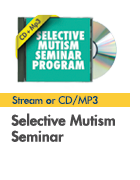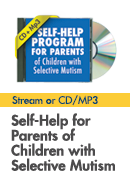According to The DSM 5, selective mutism is defined as “a consistent failure to speak in social situations in which there is an expectation for speaking despite speaking in other situations.” Also, according to The DSM 5, “selective mutism is a relatively rare disorder with onset usually before 5 but the disturbance may not come to clinical attention until entry into school.”
Social Anxiety: The Untold Story contains approximately 3 hours of state of the art and science self -help for selective mutism. In compulsion it includes rare interviews with children, teens, adults, and families who have resolved the disorder.
Experience at Berent Associates with thousands of anxiety sufferers since 1978 can help facilitate a functional understanding of this disorder and productive treatment.
While selective mutism is mostly understood as a speaking phobia, it is specifically a variation of obsessive-compulsive disorder. Obsessiveness refers to the cognitive or thinking component of worry and anxiety. The compulsion is the verbal shutdown or muteness. In essence, the mutism is driven by the obsessive compulsive mind. In his article “Obsessive-Compulsive Personality Disorder as Etiology for Performance Anxiety,” Jonathan Berent. describes how perfectionism drives performance and social anxiety. This article is highly relevant for selective mutism sufferers of any age.
Clinical experience has demonstrated that selective mutism is not so rare. The statistic that says seven out of one thousand children have it does not provide the full picture: In fact, countless adolescents and adults also suffer from variations of this disorder. Many individuals who initiate treatment for public speaking anxiety at Berent Associates have self-identified as having selective mutism. Jonathan Berent says the most common thing he has heard from patients during almost 40 years of clinical experience is “I do not have anything to say” or “I do not know what to say.” This self-censoring is a component of selective mutism.
Selective mutism impacts individuals of all ages and functioning levels. Many individuals with selective mutism are intellectually intelligent. Selective mutism, however, is a symptom that characterizes a substantial void of emotional intelligence.
The most common mistake that well-intentioned parents and professionals make when engaging the socially anxious or selectively mute child is to invest in the belief that “the child is just shy and will grow out of the problem.” The second biggest confusion is the misunderstanding regarding how ingrained the psychophysiological (mind-body) reflex becomes. The third most common confusion is when the parent says something like “My child only does not talk in school.” While school does usually present the most performance anxiety for the child with selective mutism, objective scrutiny, in most cases, will identify a pattern of verbal shutdown elsewhere. In most, cases selective mutism accrues and becomes more ingrained with time. It is an obvious precursor to avoidant and dependent personality disorder.
There is a silver lining to selective mutism. Given that it is identifiable at an early age, it presents an opportunity to get control of a complex and insidious problem before it works its way organically into emotion and behavior. Parents can have an enormously empowering influence with productive intervention as early as possible.





